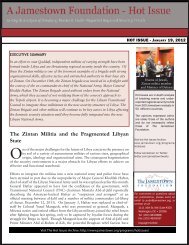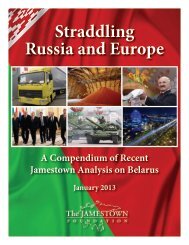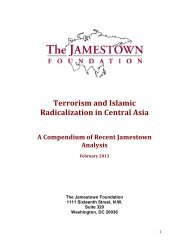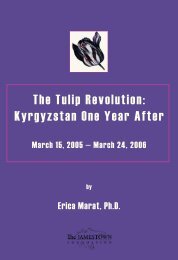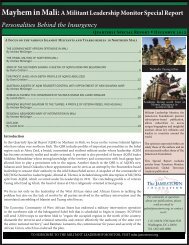ChinaBrief In a Fortnight - The Jamestown Foundation
ChinaBrief In a Fortnight - The Jamestown Foundation
ChinaBrief In a Fortnight - The Jamestown Foundation
Create successful ePaper yourself
Turn your PDF publications into a flip-book with our unique Google optimized e-Paper software.
<strong>ChinaBrief</strong> Volume XII s Issue 21 s November 6, 2012<br />
<strong>The</strong> relatively small oil project, however, may well be a<br />
foot in the door for access to major natural gas deposits<br />
in northern and northwestern Afghanistan. It was<br />
CNPC geologists from Turkmenistan with the world’s<br />
fourth largest natural gas reserves that scouted out the<br />
Amu Darya oil project and they have their eye on gas<br />
formations that straddle the border [2]. With possible<br />
recent major gas finds close by in Tajikistan, CNPC is<br />
positioning itself to reap the natural resource benefits of<br />
a long-neglected area. <strong>In</strong> June, it announced plans to run<br />
a fourth string of the Central Asia-China pipeline from<br />
Turkmenistan to Xinjiang through northern Afghanistan<br />
(Eurasia Daily Monitor, June 19). CNPC also reportedly<br />
expressed interest in the Turkmenistan-Afghanistan-<br />
Pakistan-<strong>In</strong>dia (TAPI) gas pipeline at the project’s<br />
Singapore roadshow event in September [3].<br />
Whether or not CNPC moves forward with these projects,<br />
the prominent Chinese SOE is signaling that they see<br />
northern Afghanistan as a stable area going forward<br />
(Cnpc.com.cn, June 7). Until a few months ago, militias<br />
loyal to Afghan Army Chief of Staff and local warlord<br />
Abdul Rashid Dostum harassed Chinese workers in the<br />
area, but a deal seems to have been struck where these<br />
incidents have ceased (Reuters, June 11). Should CNPC<br />
move forward with its announced plans for a natural<br />
gas pipeline, it will likely find itself working closely with<br />
Dostum and other warlords.<br />
<strong>In</strong> contrast to the opportunities blossoming in northern<br />
Afghanistan, just southeast of Kabul in Logar province<br />
the once highly touted Aynak Copper mine project is<br />
languishing. Described by President Karzai as “one of the<br />
most important economic projects in Afghan history,” the<br />
project led by Chinese SOEs Metallurgical Corporation<br />
of China (MCC) and Jiangxi Copper was valued at<br />
around $4 billion and was the largest investment project<br />
in Afghanistan (Xinhua, May 22, 2011). It, however,<br />
has been beset by problems, including an archeological<br />
dig atop the site, security concerns and now financial<br />
troubles at the parent company MCC. One report<br />
from late September stated Chinese workers had been<br />
spooked by security concerns and had left the country<br />
with only a skeleton crew left to watch over equipment<br />
(Reuters, September 27). This state of affairs seems to<br />
have reinforced skepticism of Beijing’s commitment to<br />
the project—and possibly even to Afghanistan itself—<br />
among Kabul-based officials and experts [4].<br />
12<br />
A final element that has not been sufficiently analyzed is<br />
the implication of China’s growing relationship with Kabul<br />
and its interactions with historical ally Islamabad. Whilst it<br />
is clear that China sees the importance of Pakistan in any<br />
long-term solution in Afghanistan, it is also increasingly<br />
clear that Beijing is concerned about how security in<br />
Pakistan continues to deteriorate. It thus seems likely that<br />
China’s growing focus on Afghanistan is at least in part<br />
out of recognition that it can no longer simply abrogate<br />
its strategy toward Kabul to Islamabad—a default setting<br />
Beijing previously employed. As the security situation in<br />
Afghanistan (and Pakistan) continues to muddle along<br />
in a negative direction, Beijing now has realized that<br />
it must do more to stabilize its restive neighbor. Zhou<br />
Yongkang’s visit is merely the culmination of this new<br />
focus on Afghanistan that is going to continue to develop<br />
as the 2014 deadline approaches. Whether this new<br />
attention translates into new policy resources, however,<br />
remains to be seen and probably will have to wait until<br />
after next March’s National People’s Congress, when<br />
China’s leadership transition will be completed.<br />
Raffaello Pantucci is a Visiting Scholar at the Shanghai Academy<br />
of Social Sciences and Alexandros Petersen is the author of<br />
<strong>The</strong> World Island: Eurasian Geopolitics and the Fate<br />
of the West. <strong>The</strong>ir joint research is available at http://www.<br />
chinaincentralasia.com.<br />
Notes:<br />
1. <strong>The</strong> authors visited Tashkurgan, Xinjiang (near<br />
the Sino-Afghan border) in May 2012.<br />
2. Authors’ <strong>In</strong>terviews in Kabul, May 2012.<br />
3. Authors’ <strong>In</strong>terviews in Ashgabat, Turkmenistan,<br />
September 2012.<br />
4. This is a key topic of conversation with<br />
interviewees with whom the authors spoke,<br />
including local analysts, foreign diplomats,<br />
international donors and journalists who all<br />
reached similar conclusions. Author <strong>In</strong>terviews<br />
in Kabul, May 2012.<br />
***






